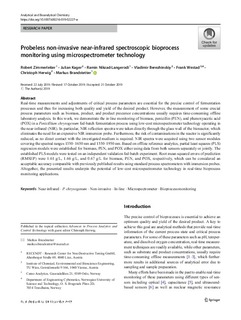| dc.contributor.author | Zimmerleiter, Robert | |
| dc.contributor.author | Kager, Julian | |
| dc.contributor.author | Nikzad-Langerodi, Ramin | |
| dc.contributor.author | Berezhinskiy, Vladimir | |
| dc.contributor.author | Westad, Frank Ove | |
| dc.contributor.author | Herwig, Christoph | |
| dc.contributor.author | Brandstetter, Markus | |
| dc.date.accessioned | 2020-02-13T11:57:01Z | |
| dc.date.available | 2020-02-13T11:57:01Z | |
| dc.date.created | 2020-02-02T20:23:59Z | |
| dc.date.issued | 2019 | |
| dc.identifier.citation | Analytical and Bioanalytical Chemistry. 2019, . | nb_NO |
| dc.identifier.issn | 1618-2642 | |
| dc.identifier.uri | http://hdl.handle.net/11250/2641530 | |
| dc.description.abstract | Real-time measurements and adjustments of critical process parameters are essential for the precise control of fermentation processes and thus for increasing both quality and yield of the desired product. However, the measurement of some crucial process parameters such as biomass, product, and product precursor concentrations usually requires time-consuming offline laboratory analysis. In this work, we demonstrate the in-line monitoring of biomass, penicillin (PEN), and phenoxyacetic acid (POX) in a Penicillium chrysogenum fed-batch fermentation process using low-cost microspectrometer technology operating in the near-infrared (NIR). In particular, NIR reflection spectra were taken directly through the glass wall of the bioreactor, which eliminates the need for an expensive NIR immersion probe. Furthermore, the risk of contaminations in the reactor is significantly reduced, as no direct contact with the investigated medium is required. NIR spectra were acquired using two sensor modules covering the spectral ranges 1350–1650 nm and 1550–1950 nm. Based on offline reference analytics, partial least squares (PLS) regression models were established for biomass, PEN, and POX either using data from both sensors separately or jointly. The established PLS models were tested on an independent validation fed-batch experiment. Root mean squared errors of prediction (RMSEP) were 1.61 g/L, 1.66 g/L, and 0.67 g/L for biomass, PEN, and POX, respectively, which can be considered an acceptable accuracy comparable with previously published results using standard process spectrometers with immersion probes. Altogether, the presented results underpin the potential of low-cost microspectrometer technology in real-time bioprocess monitoring applications | nb_NO |
| dc.language.iso | eng | nb_NO |
| dc.publisher | Springer Verlag | nb_NO |
| dc.rights | Navngivelse 4.0 Internasjonal | * |
| dc.rights.uri | http://creativecommons.org/licenses/by/4.0/deed.no | * |
| dc.title | Probeless non-invasive near-infrared spectroscopic bioprocess monitoring using microspectrometer technology | nb_NO |
| dc.type | Journal article | nb_NO |
| dc.type | Peer reviewed | nb_NO |
| dc.description.version | publishedVersion | nb_NO |
| dc.source.pagenumber | 7 | nb_NO |
| dc.source.journal | Analytical and Bioanalytical Chemistry | nb_NO |
| dc.identifier.doi | 10.1007/s00216-019-02227-w | |
| dc.identifier.cristin | 1789944 | |
| dc.description.localcode | This article is distributed under the terms of the Creative Commons Attribution 4.0 International License (http://creativecommons.org/licenses/by/4.0/), which permits unrestricted use, distribution, and reproduction in any medium, provided you give appropriate credit to the original author(s) and the source, provide a link to the Creative Commons license, and indicate if changes were made. | nb_NO |
| cristin.unitcode | 194,63,25,0 | |
| cristin.unitname | Institutt for teknisk kybernetikk | |
| cristin.ispublished | true | |
| cristin.fulltext | original | |
| cristin.qualitycode | 1 | |

